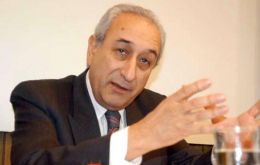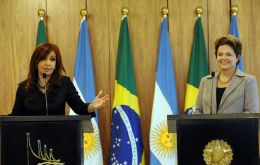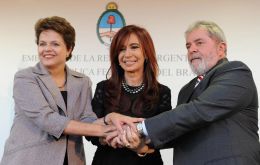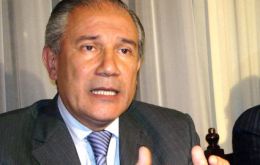MercoPress. South Atlantic News Agency
Tag: Argentina
-
Monday, August 1st 2011 - 20:23 UTC
”We’re the first force nationally and second in Buenos Aires City”, says cabinet chief

Argentine Chief of Staff, Aníbal Fernández, came on stage Monday after the Buenos Aires City runoff elections to give his breakdown of Sunday’s events which have been described by political analysts a landslide victory for the incumbent mayor Mauricio Macri.
-
Monday, August 1st 2011 - 06:51 UTC
Argentina planning a “nuclear powered” submarine with conventional weapons

Argentina is considering the development of “nuclear propulsion” for its diesel-engine submarines, according to Defence minister Arturo Puricelli. The initiative follows a request from President Cristina Fernandez and is closely linked to Brazil’s construction of a first nuclear powered submersible with French technology.
-
Monday, August 1st 2011 - 06:25 UTC
Brazil reiterates Falklands-flagged vessels will be banned from entering its ports

Brazil reiterated its intention of banning all Falklands’ flagged vessels from calling at the country’s ports and described as “illegal” the current round of oil exploration in the Islands’ waters.
-
Monday, August 1st 2011 - 05:44 UTC
Argentine police on the track of two French tourist packers killed in Salta

Police in the Argentine north-west province of Salta reported to have two suspects following a wide search Sunday across the local area of San Lorenzo for the killer of the two French tourists whose bodies were found on Friday, officials reported.
-
Monday, August 1st 2011 - 05:36 UTC
Re-elected Bs. As. City mayor to meet all presidential candidates, even CFK

Re-elected Buenos Aires City Mayor Mauricio Macri gave his victory speech after defeating Kirchnerite Daniel Filmus on Sunday, and said his party (PRO) would begin the process of deciding which of the presidential candidates to support in Argentina’s general elections of next October.
-
Saturday, July 30th 2011 - 22:33 UTC
Cristina and Dilma reaffirm ‘strategic alliance and commitment to Mercosur

Argentina and Brazil reaffirmed on Friday their strategic alliance and commitment to Mercosur and regional integration during a summit in Brasilia, where President Cristina Fernández de Kirchner together with her Brazilian peer Dilma Rousseff inaugurated the new Argentine Embassy in the Brazilian capital.
-
Friday, July 29th 2011 - 07:25 UTC
One officer and 3 civilians killed during eviction of a landsite in north Argentina

A shootout between police and civilians in Argentina’s northern province of Jujuy left one officer and four protesters dead plus more than 30 injured, after clashes occurred during the eviction of more than four hundred families from a land site.
-
Friday, July 29th 2011 - 07:17 UTC
Bank of Nova Scotia drops legal actions against Argentina for 600m dollars

Argentina’s central bank said the Bank of Nova Scotia dropped legal actions against the country under which it sought 600 million dollars.
-
Friday, July 29th 2011 - 07:08 UTC
Repsol-YPF earnings hit by civil war in Libya and labour strikes in Argentina

Repsol-YPF, Spain’s largest oil company, said second-quarter earnings fell 7.3% after refining margins narrowed and output declined because of the civil war in Libya and strikes in Argentina.
-
Friday, July 29th 2011 - 06:27 UTC
Brazil has not been ‘soft’ on Argentina and on imports from China

Brazilian officials brushed aside claims from exporters that the country has been ‘soft’ on Argentina and on imports from Asia, mainly China, arguing that trade figures indicate something different and “you can’t have it both ways, liberal and protectionist”.
